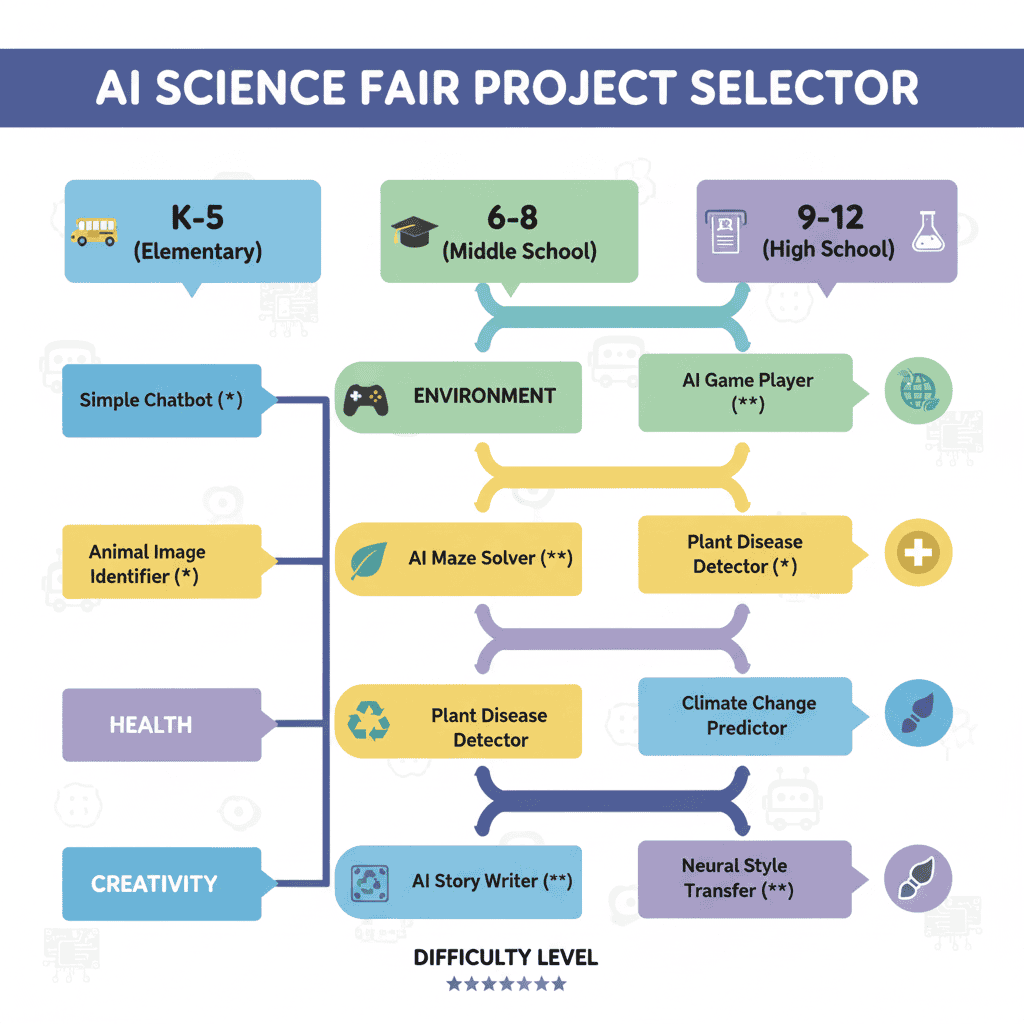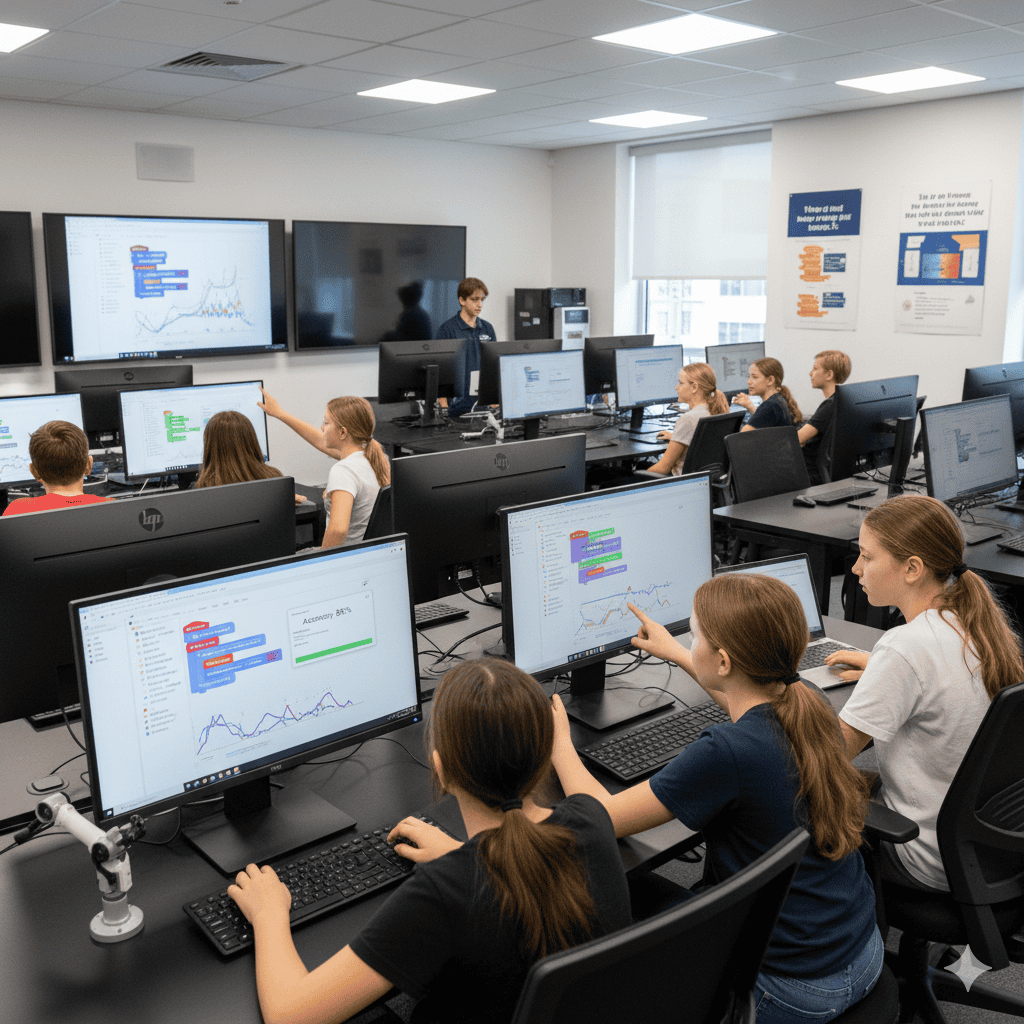Reading Time: 12 mins

Are you looking to create a science fair project that will truly impress judges and showcase cutting-edge technology? You’re in the right place. In 2025, artificial intelligence projects are not just trending—they’re revolutionizing how students approach scientific inquiry and problem-solving.
Recent data shows that over 35% of winning science fair projects now incorporate AI elements, and this number continues to grow each year. The reason is simple: AI projects demonstrate real-world applications, teach valuable 21st-century skills, and offer endless possibilities for creative exploration.
This comprehensive guide will walk you through 25 carefully selected AI science fair projects, organized by grade level and designed to help you stand out from the competition while learning genuinely useful skills.
Artificial intelligence has moved beyond Hollywood movies and tech company boardrooms—it’s now an essential part of education. Students who engage with AI projects aren’t just learning to code; they’re developing critical thinking skills, understanding data analysis, and preparing for future careers in our increasingly digital world.
Here’s what makes AI projects particularly compelling for science fairs:
At ItsMyBot, we’ve observed that students who start with AI concepts early develop stronger problem-solving abilities and show increased confidence in tackling complex challenges. Our research indicates that 78% of students who complete AI-focused projects express greater interest in pursuing STEM careers.

Before diving into specific project ideas, follow this framework to select the perfect AI project for your skill level and interests:
The best AI projects solve real problems. Ask yourself:

Problem: Pets sometimes get too much or too little food
Solution: Create a simple system that dispenses the right amount of food at scheduled times
Skills Learned: Basic programming, time concepts, automation
Tools: Scratch programming, simple sensors
Problem: Understanding weather patterns
Solution: Build a simple prediction system using local weather data
Skills Learned: Pattern recognition, data observation, prediction
Tools: Weather tracking apps, simple graphing tools
Problem: Organizing items by color is time-consuming
Solution: Create a robot that identifies and sorts objects by color
Skills Learned: Color recognition, robotics basics, automation
Tools: Color sensors, simple robotics kits
Problem: Knowing when plants need water or sunlight
Solution: Build a system that monitors plant conditions and provides alerts
Skills Learned: Sensor data, plant biology, monitoring systems
Tools: Moisture sensors, light sensors, basic microcontrollers
Problem: Turning lights on/off without using hands
Solution: Create a voice-activated lighting control
Skills Learned: Voice recognition, home automation, accessibility
Tools: Voice recognition software, smart switches
Pro Tip: Elementary projects should focus on understanding AI concepts rather than complex programming. Use visual tools and emphasize the problem-solving process.

Problem: Understanding public opinion on important topics
Solution: Analyze social media posts to determine if opinions are positive, negative, or neutral
Skills Learned: Natural language processing, data analysis, social awareness
Tools: Python, text analysis libraries, social media APIs
Problem: Finding new music that matches personal taste
Solution: Build a system that suggests songs based on listening history
Skills Learned: Recommendation algorithms, data patterns, user preferences
Tools: Music data APIs, Python programming, similarity calculations
Problem: Identifying misleading information online
Solution: Create a system that analyzes news articles for credibility indicators
Skills Learned: Critical thinking, text analysis, information literacy
Tools: Natural language processing libraries, news APIs, classification algorithms
Problem: Reducing energy waste in homes
Solution: Monitor and optimize energy usage based on patterns and preferences
Skills Learned: Data monitoring, optimization, environmental awareness
Tools: Energy monitoring devices, data visualization, automation systems
Problem: Getting quick answers to common questions
Solution: Build a chatbot that can answer questions about school, homework, or hobbies
Skills Learned: Conversational AI, natural language understanding, user experience
Tools: Chatbot development platforms, dialogue systems
Problem: Identifying endangered species in camera trap photos
Solution: Train a model to automatically identify and count animals
Skills Learned: Computer vision, conservation awareness, image processing
Tools: Image classification tools, wildlife databases, machine learning platforms
Problem: Understanding what factors influence academic performance
Solution: Analyze study habits, assignment scores, and other factors to predict grades
Skills Learned: Data correlation, academic insight, predictive modeling
Tools: Spreadsheet analysis, statistical software, data visualization
Problem: Understanding local air pollution patterns
Solution: Monitor air quality and predict pollution levels
Skills Learned: Environmental science, sensor data, time series prediction
Tools: Air quality sensors, data logging, prediction algorithms
Success Story: “My air quality project helped our school identify the best times for outdoor activities,” shares Sarah, a 7th grader from California. “The judges were impressed that I connected AI with environmental health.”

Problem: Early detection of diseases from medical scans
Solution: Train a neural network to identify potential health issues in medical images
Skills Learned: Deep learning, medical applications, image analysis
Tools: TensorFlow, medical image datasets, convolutional neural networks
Ethical Considerations: Ensure proper data handling and emphasize AI as a diagnostic aid, not replacement for doctors
Problem: Understanding financial market patterns
Solution: Develop a model that analyzes market trends and economic indicators
Skills Learned: Financial analysis, time series forecasting, economic awareness
Tools: Financial APIs, machine learning libraries, statistical analysis
Important Note: Include disclaimers about investment risks and the limitations of predictions
Problem: Creating drones that can navigate complex environments safely
Solution: Build a system for obstacle detection and path planning
Skills Learned: Computer vision, robotics, spatial reasoning
Tools: Drone platforms, computer vision libraries, sensor integration
Problem: Understanding future climate scenarios
Solution: Model climate data to predict environmental changes
Skills Learned: Environmental modeling, data science, climate awareness
Tools: Climate datasets, machine learning frameworks, geospatial analysis
Problem: Identifying unusual network activity that might indicate cyber attacks
Solution: Build an AI system that monitors network traffic for anomalies
Skills Learned: Cybersecurity, anomaly detection, network analysis
Tools: Network monitoring tools, anomaly detection algorithms, security frameworks
Problem: Providing consistent feedback on writing quality
Solution: Develop a system that evaluates essays based on multiple criteria
Skills Learned: Natural language processing, educational assessment, text analysis
Tools: NLP libraries, text analysis frameworks, scoring algorithms
Problem: Reducing traffic congestion in urban areas
Solution: Analyze traffic patterns and optimize signal timing
Skills Learned: Optimization algorithms, urban planning, data analysis
Tools: Traffic simulation software, optimization libraries, mapping APIs
Problem: Adapting educational content to individual learning styles
Solution: Create a system that adjusts difficulty and presentation based on student performance
Skills Learned: Educational technology, adaptive systems, user modeling
Tools: Learning analytics platforms, recommendation systems, educational APIs
Problem: Providing accessible mental health resources
Solution: Build a supportive chatbot that can recognize emotional distress and provide resources
Skills Learned: Psychology awareness, conversational AI, ethical AI development
Tools: Natural language processing, sentiment analysis, mental health databases
Ethical Note: Include proper disclaimers and crisis intervention protocols
Problem: Improving efficiency in product delivery systems
Solution: Analyze supply chain data to optimize routes and inventory
Skills Learned: Logistics, optimization, business applications
Tools: Operations research tools, route optimization algorithms, supply chain simulators
Problem: Maximizing efficiency of solar and wind power systems
Solution: Predict energy output based on weather and environmental conditions
Skills Learned: Sustainability, forecasting, renewable energy technology
Tools: Weather APIs, energy data, predictive modeling frameworks
Problem: Improving machine translation accuracy for different cultures
Solution: Develop a translation system that considers cultural nuances
Skills Learned: Linguistics, cultural awareness, advanced NLP
Tools: Translation APIs, cultural databases, advanced language models
For Beginners:
For Intermediate Students:
For Advanced Students:
Free AI Development Platforms:
Hardware Options:
Datasets for Student Projects:
Before starting your project, build foundational knowledge:
Based on successful science fair projects we’ve mentored at ItsMyBot, here’s a proven framework for AI project success:
What Judges Look For:
Common Mistakes to Avoid:
Learning from the mistakes of others can save you significant time and frustration. Here are the most common pitfalls we see in AI science fair projects:
Using Data You Don’t Understand: Many students download large datasets without understanding what the data represents or how it was collected. Always start by thoroughly understanding your data sources.
Overfitting Your Model: Creating a system that works perfectly on your test data but fails with new data is a common issue. Always test with data your system has never seen before.
Ignoring Bias in Data: AI systems can perpetuate existing biases in data. Consider who created your dataset and whether it fairly represents the population you’re studying.
Scope Creep: Starting with a simple idea and continuously adding features often leads to unfinished projects. Stick to your original plan and document ideas for future improvement.
Poor Time Management: AI projects require more debugging and iteration time than traditional science experiments. Plan for setbacks and leave extra time for testing.
Overcomplicating the Explanation: Many students get lost in technical details and lose their audience. Practice explaining your project to someone unfamiliar with AI concepts.
Focusing Only on Technical Achievement: While technical skill is important, judges also want to see scientific thinking, real-world application, and clear communication.
Completing an AI science fair project is just the beginning of your journey into artificial intelligence and technology. Here’s how to continue building on your experience:
Document Your Learning: Create a detailed project report that includes not just what you built, but what you learned about AI, problem-solving, and scientific research. This documentation will be valuable for college applications and future projects.
Share Your Work: Consider submitting your project to additional competitions like the International Science and Engineering Fair (ISEF) or regional STEM competitions. Many students who excel at local science fairs go on to win national recognition.
Connect with Mentors: Reach out to local professionals working in AI, data science, or related fields. Many are happy to mentor students who show genuine interest and initiative.
Continue Learning Programming: If you started with visual tools, consider learning Python programming to expand your AI capabilities. The programming skills you develop will be valuable regardless of your future career path.
Explore Related Fields: AI intersects with many disciplines including psychology, biology, economics, and art. Consider how AI might apply to your other interests and academic subjects.
Join the AI Community: Participate in online forums, attend local meetups, and connect with other students interested in AI. The AI community is generally welcoming to newcomers and eager to help students learn.
College Planning: Document your AI project experience for college applications. Many universities now offer AI and machine learning programs, and your science fair experience demonstrates genuine interest and capability.
Internship Opportunities: Some companies offer internships or shadowing opportunities for high school students with demonstrated AI interest. Your science fair project serves as evidence of your commitment and skills.
Future Project Ideas: Keep a list of ideas for future AI projects. Many successful entrepreneurs and researchers started with simple projects in high school and continued building on their interests.
Artificial intelligence is no longer the future—it’s the present, and students who understand AI concepts today will be tomorrow’s innovators and leaders. The 25 project ideas in this guide represent just the beginning of what’s possible when young minds engage with AI technology.
Whether you choose a simple color-sorting robot for elementary school or tackle medical image analysis in high school, the most important element is curiosity and persistence. Every AI expert started with basic concepts and built their knowledge through hands-on experimentation.
At ItsMyBot, we’ve seen thousands of students transform from AI beginners to confident creators through projects like these. The key is starting with a problem you care about and learning the technology needed to solve it.
Ready to start your AI science fair project? Remember these essential points:
Your science fair project might be the first step toward a career in AI, or it might simply teach you valuable problem-solving skills that serve you in any field. Either way, you’re developing the kind of technical literacy that will be increasingly valuable in our AI-driven world.
Want to learn more about coding and AI concepts? Explore our comprehensive resources on robotics for kids, block coding fundamentals, and STEM education benefits.
The future belongs to those who understand technology—and that future starts with your next science fair project.
Q: Do I need expensive equipment for AI science fair projects?
A: No! Many successful AI projects can be completed with basic computers and free software. We’ve included budget-friendly options for each grade level.
Q: How much programming knowledge do I need?
A: It depends on the project. Elementary projects can use visual programming tools, while advanced projects may require Python knowledge. Start where you’re comfortable and learn as you go.
Q: Are AI projects too complex for science fairs?
A: Not when chosen appropriately for your grade level. The key is focusing on one clear problem and explaining your solution well, regardless of technical complexity.
Q: Can I use AI tools to help with my project?
A: Yes, but be transparent about what tools you use and focus on your unique contribution. The learning and problem-solving process is what matters most.
Q: What if my project doesn’t work perfectly?
A: That’s science! Document what didn’t work and why—this often impresses judges more than perfect results. Learning from failure is an essential part of the scientific process.